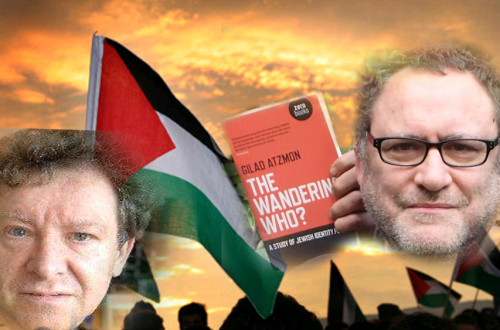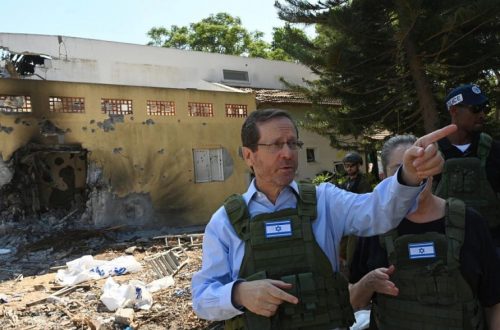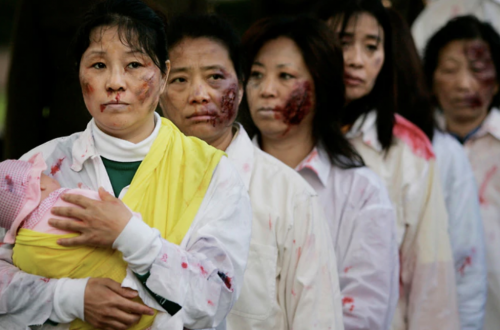This is a cross-post from Joseph Weissman
Last night, I attended the Manchester screening of the new 1hr 2omin film With God On Our Side, hosted by the Nazarene Theological College. As film-director Porter Speakman Jr and Anglican vicar Stephen Sizer were presenting the film, I chose to go along and watch.
The film introduced the heavy-hitters from the ultra-conservative American Christian Zionist movement, notably John Hagee of Christians United For Israel and the more eloquent Malcolm Hedding of the International Christian Embassy in Jerusalem. There was also an interview with a representative from Christian Friends of Israel Communities, which boasts of being the only Christian organisation exclusively supporting the settlements in Judea and Samaria (sic).
There was footage from a John Hagee conference and other audio clips from Christian Zionists explaining how they thought God had given the land of Israel to the Jewish people, and how they imagined Israel would naturally expand as part of God’s plan for the world. This was interspersed with clips of settler-Jewish nationalism, unjust Israeli policies and notes about past UN resolutions and peace negotiations which many Palestinians considered to be unfair.
The film starred the dubious cast-list of Rev Stephen Sizer, Prof Gary Burge (sounding uncannily like Agent Smith from the Matrix), Middle East “journalist” Ben White, the decidedly questionable historian Ilan Pappe, and the anti-Zionist Jewish critic Norman Finkelstein.
To the extent that the cast criticised unthinking Christian Zionist support for any Israeli policy in order for Israel to expand and develop at any cost, this was a good film. It was an excellent critique of a US-based phenomenon that has perpetuated and aggravated mistrust in the Middle East.
However, the film failed to mention the nuances of Christian support for Israel. Not all Christian supporters of Israel are obsessed with the End Times, or expanding the kingdom of God by enlarging Israel’s borders. Most Christian supporters of Israel are pragmatists. They recognise the unique freedoms that Israel provides in the Middle East, the pragmatic need for a democratic Jewish state following the horrors of the Shoah, and the continuing, menacing presence of antisemitism throughout the world.
These Christians were not deemed worthy of a mention.
There were, clearly, serious problems with the historical narrative offered in the film. There was no mention of Hamas or Hezbollah rocket attacks, very little mention of suicide bombing (and usually, when it was mentioned, as a way of criticising cynical Israeli policies), and little mention of Palestinian Authority or Arab League rejectionism, or indeed the finer points of complex Israeli-Palestinian negotiations.
Perhaps more worrying than the historical narrative offered was the theology that accompanied it.
Sizer and Burge argued that there is no sense in which Jews can be described as the “Chosen People” if you read the New Testament properly. Sizer and Burge drew a direct line between political Christian Zionism and recognition of the Jews as a Chosen People. I don’t think that is the case at all – there are many non-Zionists who still see Jews as a Chosen People, and many orthodox and mainstream Christian scholars who argue that Jews are still a Chosen People. Furthermore, there are left-wing Christian Zionists who want a two-state solution, whose theology is by no means extreme.
For the purposes of the film however, all Christian Zionists were reactionary, unthinking, and to the right of Likud. No mention of the more moderate American and British Christian Zionists.
After the film was screened, there was an opportunity for Questions & Answers. Stephen Sizer and Porter Speakman Jr fielded the questions.
A Messianic Jewish member of the audience thanked Porter Speakman for only focusing on the extreme American wing of Christian Zionism, recognising that the situation was far different in UK Christian circles.
A leader from the Zionist Central Council of Greater Manchester who was in attendance mentioned he felt uncomfortable with the right-wing Christian Zionists represented in the video, but wanted to point out to the Christians present that there were different shades of Zionism.
One Christian woman was simply interested in how she could demonstrate Christ’s love and grace to all people in the Middle East, stressing she had no political interest in being pro-Israeli or pro-Palestinian, and then asked Sizer and Speakman for guidance on this matter.
Richard Gold from Engage – who made clear his opposition to the settlements and the occupation – asked Reverend Sizer that, if he truly believed in Love Thy Neighbour, why had he forwarded emails from Holocaust deniers?
[The emails in question were this one from Holocaust-denier Michael Hoffman, and this one in which conspiracy theorist Mike Collins Piper claims the Zionist lobby had silenced fellow Holocaust-denier Dale Crowley, whom Sizer has also cited]
Sizer responded to Gold that he had never knowingly forwarded emails from Holocaust deniers. Providentially, I had remembered to bring print-outs of the original emails with me and was able to wave them in the air.
At this point Sizer seemed rather anxious. Sizer ignored Gold’s question, preferring to highlight how he felt aggrieved by his critics. I piped up with a lengthy list of controversial figures Sizer had chosen to associate with. Sizer eventually conceded that, if he had cited Dale Crowley in his book, he hadn’t known that Crowley was a Holocaust-denier at the time.
Apparently, neither was he aware of the extreme views of Israel Shamir (whose article he hosted on his website until recently), Collins-Piper, Hoffman, Cassiem, Mostafavi, Sharbaf, Fakhry, Dankof or Tobin either.
Another person then asked Sizer why he had suggested Israeli complicity in 9/11. Sizer’s response was equivocal, mentioning that there were various websites offering different theories about what actually happened on 9/11.
Perhaps wishing to restore a sense of calm to procedures, or perhaps recognising that the Q & A session was not going as he had expected it to, Porter Speakman brought an end to the Q & A session about ten minutes prematurely.
One person called out: “Were the factual errors deliberate?”
Then the dean brought the meeting to a close, stressing that his college would never support any academic boycott of Israel, and had been linked to Israeli academics for 22 years. He left clutching copies of the emails I had brought to the meeting.
The dean’s wife let out a shocked gasp when she heard one lone anti-Zionist activist tell myself and others he wanted to use our faces as a “punchbag.” I said “that’s a bit harsh,” and he promptly moderated his comment, saying “I meant a verbal punchbag.” Never heard of a face being used as a verbal punchbag, I thought.
After the Q & A, Speakman and Sizer moved to the lobby, whilst myself and others from Engage stayed in the main room where the screening had taken place, enjoying many constructive conversations.
I had the opportunity to chat with various Wesleyan students about the Palestine-Israel conflict, many of whom were confused about what to think and what theology they should apply to the situation.
Most people I chatted to realised the simplest theology is the best, i.e. to show the fruits of the spirit and to be loving and kind and merciful towards Israelis and Palestinians alike. The Wesleyan students didn’t want a complicated approach, and many seemed disturbed both by the ultra-Zionism and the anti-Zionism they had variously observed in Christian circles. They were mature in their conversations and a credit to their college.
I was then introduced to Reverend Sizer by a friend. We shook hands, and then Sizer offered to give me a hug. I said “sorry Sir, I’m not a huggy person”. That isn’t strictly true, but I just didn’t feel comfortable giving him a hug. I think he understood this intuitively, and replied “well at least we’ve shaken hands.” I agreed, and it was nice that we could both approach each other without any sense of bitterness.
But I still had a few questions about Sizer’s modus operandis, especially the Sizergate incident – why? how? for what purpose? motivation? etc. I tried to ask Sizer questions about the claims of Mordechai haCohen, a rather tragic Israeli Messianic Jew who sent me some rather odd messages, claiming to be employed by Sizer. Sizer told me had discovered Mordechai in his church graveyard and had since set him up with a laptop computer.
Truth be told, I found this all slightly bizarre.
As we were talking I also had a chance to shake hands with Porter Speakman, who was a very affable and charming individual in person (although, he is yet to let my comments pass through moderation on his blog, unfortunately).
Having now met both men and seen the film for myself, I think that both Sizer and Speakman clearly have something to contribute to the debate about Christian theology and Israel. It’s certainly right for them to highlight the extremes of Christian theology that depersonalises Israelis and dehumanises Palestinians. They are completely correct to insist upon a more organic, gospel-centred approach to peace-making in the Middle East.
However, when it comes to presenting a full narrative on the Israel/Palestine, I think Speakman and Sizer are out of their depth. Sizer remarked that he had not known about his Holocaust-denying sources.
Richard Gold asked Sizer whether he was concerned that he couldn’t distinguish between Holocaust-denying sources and his own sources when critiquing Israel.
Sizer had no answer.
Earlier in the Q & A, Speakman admitted that he had not presented a full enough picture of the conflict in 82 minutes. Speakman said he wasn’t particularly bothered about whether there was a one state solution or a two state solution, but said he thought that Two State was dead.
I was rather disappointed that a film-maker who had put such energy and effort into making a film about the dangers of extreme ideologies in the Middle East would say such a thing. Speakman couldn’t bring himself to at least acknowledge his desire for a safe and secure Israel alongside a safe and secure Palestine, in-line with the will of the international community.
Perhaps Sizer and Speakman both approached the Christian debate on Israel/Palestine with good intentions, but good intentions are not enough with political presentations. If you are going to hold one political movement up to the light, the chances are you will be scrutinised in much the same way if you make a political comment. I think this is a good thing, indeed necessary for health democracies.
Within Christian circles, Sizer admirably supports Musalaha, a reconciliation ministry between Israeli and Palestinian believers in Christ. If he wishes to extend this approach to wider society, he would do well to support the One Voice movement to bring an end to the conflict via a robust and fair two-state solution.
Before then, I think he has to answer his critics in a mature and reasonable way. Sadly, offering hugs to his critics will not placate people’s concerns about Sizer’s approach to Israel/Palestine.
Sizer is now claiming that he at point #5 of a 7-stage Zionist plot to eliminate him completely, which perhaps says more about his personal paranoia than it does about people who don’t like his film.
Sizer told Jewish participants in the debate that Speakman’s film was made for Christians by Christians, and as such was an internal debate for Christians. On various occasions, Sizer used this line on Gold and other Jewish members of the audience.
But I think you can’t criticise a Jewish political movement that extends far beyond Christians, and then tell Jews who object that their comments are less relevant as they are not Christians themselves.
It would be great also if Sizer would refine his own theology and not use the New Testament as a weapon against Zionism. Rather, he could use a more charitable reading of New Testament to help improve Zionism.
Until he does, I think he’s just going round in circles.


